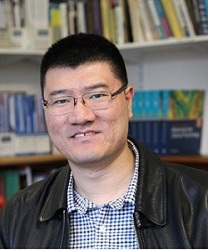Brainnetome Lecture Series - Neuroimaging and computational exploration of neurodegenerative dementia
Abstract
Dementia currently affects over 850,000 people in the UK, costs the UK £26 billion a year, and is estimated to increase to over 1 million people by 2025 with increasing life expectancy (Alzheimer's Society 2015 reports). Pivotal to responding to this "time bomb" are biomarkers that predict susceptibility to dementia. Neural degeneration and dysfunction leading to dementia may begin decades before symptoms and cognitive decline present. Hence, the recognition of early imaging markers of dementia may allow more effective intervention or even prevent dementia from happening.
Here, I will present current and recent neuroimaging research conducted in my lab in University of Cambridge and collaborating centres nationally (Oxford, Imperial and Edinburgh) and internationally (Dublin and China) in seeking for potential early neuroimaging biomarkers for different types of dementia, such as Alzheimer's disease and Lewy body dementia. I combine multimodal imaging (MEG, EEG, MRI and PET) with genetics and computational modelling to reveal neural mechanisms underlying dementia, and how risk factors (e.g. family history of dementia, APOE and MAPT genotype) affect brain structure, functions and behaviours across lifespan including in young and mid aged individuals.
We argue that multimodal imaging and genetics have the potential to identify early changes in brain structure and functions at both regional and molecular levels. However, characterising their relationships and neural mechanisms requires formal modelling such as computational psychiatry approaches.
Biography
Dr Li Su is a principal investigator leading the Computational Psychiatry Laboratory in the Department of Psychiatry and co-leading the NeuroTechnology Group in the Institute for Neuroscience at the University of Cambridge. He is an affiliated member of the EPSRC Centre for Mathematical Imaging in Healthcare. He chairs the Alzheimer’s Research UK East Network Centre and is a Fellow at Clare Hall. He severs as editorial board members for several international journals. He co-leads the neuroimaging research in PREVENT-dementia, a multi-centre international consortium for early detection of dementia. He has a distinguished track record in the development of innovative and original methods of imaging analysis and their applications to psychiatric and late-life degenerative disorders, and is an expert in MRI, PET, EEG and MEG, as well as Artificial Intelligence (AI) based computational modelling. He has published over 60 papers, many of which have been widely cited and made real impacts on the field. He also has a strong record of successful grant income including a highly prestigious Senior Fellowship from Alzheimer’s Research UK. He has been given the International College of Geriatric Psychoneuropharmacology Junior Investigator Award (2015) and International Psychogeriatric Association Junior Research Award in Psychogeriatrics (2016).

